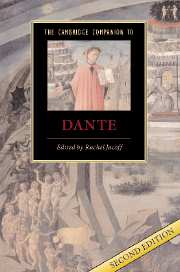Book contents
- Frontmatter
- 1 Life of Dante
- 2 Dante and the lyric past
- 3 Approaching the Vita nuova
- 4 From auctor to author: Dante before the Commedia
- 5 Introduction to Inferno
- 6 Introduction to Purgatorio
- 7 Introduction to Paradiso
- 8 Dante and the Bible
- 9 Dante and the classical poets
- 10 Allegory and autobiography
- 11 A poetics of chaos and harmony
- 12 The theology of the Comedy
- 13 The poetry and poetics of the creation
- 14 Dante and Florence
- 15 Dante and the empire
- 16 Dante and his commentators
- 17 Dante in English
- Further reading
- Index
- Series List
16 - Dante and his commentators
Published online by Cambridge University Press: 28 May 2007
- Frontmatter
- 1 Life of Dante
- 2 Dante and the lyric past
- 3 Approaching the Vita nuova
- 4 From auctor to author: Dante before the Commedia
- 5 Introduction to Inferno
- 6 Introduction to Purgatorio
- 7 Introduction to Paradiso
- 8 Dante and the Bible
- 9 Dante and the classical poets
- 10 Allegory and autobiography
- 11 A poetics of chaos and harmony
- 12 The theology of the Comedy
- 13 The poetry and poetics of the creation
- 14 Dante and Florence
- 15 Dante and the empire
- 16 Dante and his commentators
- 17 Dante in English
- Further reading
- Index
- Series List
Summary
No poem has ever drawn the attention of so many exegetes as has Dante's Divina Commedia. It is probably fair to say that any young student of poetry who was aware of what is required of a dantista would happily choose to remain an amateur in respect to the poem, would choose to own it privately, only as it speaks to one's own eyes and ears. Dante himself is so much richer and deeper than we who write about him are, and allow him to seem, that the defender of the uses of the commentary tradition may be expected to display a certain hesitation. That tradition is so vast that those who decide to devote themselves to the study of it tend, understandably enough, to lose sight of the poem upon which this huge and unwieldly corpus sits. Nonetheless, we should probably observe that the originary fault lies with Dante himself. For no other poet has more evidently hoped to have a commentator at his margins. (Boccaccio, rightly, was so worried that no one would ever contribute a commentary to his Teseida that he supplied his own; and it was probably the existence of his own marginalia which encouraged at least two later and now mainly forgotten studiosi to contribute theirs.)
The more than twenty addresses to the reader which we find in the Divina Commedia are perhaps the single most unmistakable sign that Dante has invited us to share the burden of the poem's interpretation, suggesting both that he has written it in such a way as to create a series of problems for the reader, and that these problems have solutions.
- Type
- Chapter
- Information
- The Cambridge Companion to Dante , pp. 270 - 280Publisher: Cambridge University PressPrint publication year: 2007
- 1
- Cited by



